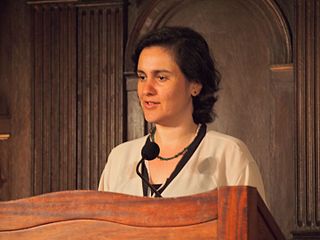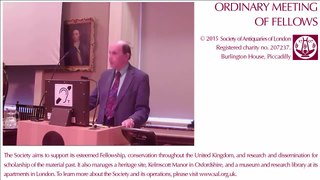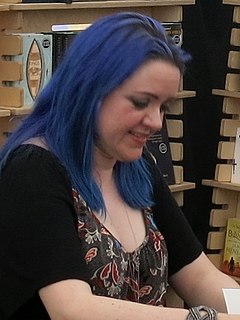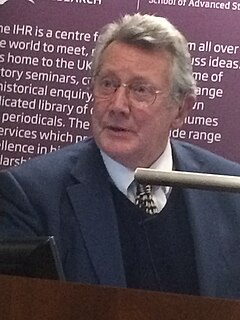Related Research Articles

Kamila Shamsie FRSL is a Pakistani and British writer and novelist who is best known for her award-winning novel Home Fire (2017). Named on Granta magazine's list of 20 best young British writers, Shamsie has been described by The New Indian Express as "a novelist to reckon with and to look forward to." She also writes for publications including The Guardian, New Statesman, Index on Censorship and Prospect, and broadcasts on radio.
John Barton is a British Anglican priest and biblical scholar. From 1991 to 2014, he was the Oriel and Laing Professor of the Interpretation of Holy Scripture at the University of Oxford and a Fellow of Oriel College. In addition to his academic career, he has been an ordained and serving priest in the Church of England since 1973.
Robert Macfarlane is a British writer and Fellow of Emmanuel College, Cambridge.

Bettany Mary Hughes is an English historian, author and broadcaster, specialising in classical history. Her published books cover classical antiquity and myth, and the history of Istanbul. She is active in efforts to encourage the teaching of the classics in UK state schools. Hughes was appointed OBE in 2019.
The Orwell Prize, based at University College London, is a British prize for political writing. The Prize is awarded by The Orwell Foundation, an independent charity governed by a board of trustees. Four prizes are awarded each year: one each for a fiction and non-fiction book on politics, one for journalism and one for "Exposing Britain's Social Evils" ; between 2009 and 2012, a fifth prize was awarded for blogging. In each case, the winner is the short-listed entry which comes closest to George Orwell's own ambition to "make political writing into an art".

Hallie Rubenhold is a British historian and author. Her work specializes in 18th and 19th century social history and women's history. Her 2019 book The Five, about the lives of the women murdered by Jack the Ripper, was shortlisted for the Wolfson History Prize and won the Baillie Gifford Prize for Non-fiction. Rubenhold's focus on the victims of murder, rather than on the identity or the acts of the perpetrator, has been credited with changing attitudes to the proper commemoration of such crimes and to the appeal and function of the true crime genre.

Lavinia Elaine Greenlaw is an English poet, novelist and non-fiction writer. She won the Prix du Premier Roman with her first novel and her poetry has been shortlisted for awards that include the T. S. Eliot Prize, Forward Prize and Whitbread Poetry Prize. Her 2014 Costa Poetry Award was for A Double Sorrow: A Version of Troilus and Criseyde. Greenlaw currently holds the post of Professor of Creative Writing (Poetry) at Royal Holloway, University of London.

Nicholas Orme is a British historian specialising in the Middle Ages and Tudor period, focusing on the history of children, and ecclesiastical history, with a particular interest in South West England.

Alex von Tunzelmann is a British historian, screenwriter and author.
Joanna Bourke, is a British historian and academic. She is professor of history at Birkbeck, University of London.

Vic Gatrell is a British historian. He is a Life Fellow of Gonville and Caius College, Cambridge.
Jean Sprackland is an English poet and writer, the author of five collections of poetry and two books of essays about place and nature.
Amanda Jane Vickery is an English historian, writer, radio and television presenter, and professor of early modern history at Queen Mary, University of London.
Deryn Rees-Jones is an Anglo-Welsh poet, who lives and works in Liverpool. Although, Rees-Jones has spent much of her life in Liverpool, she spent much of her childhood in the family home of Eglwys-bach in North Wales. She considers herself a Welsh writer.

Francesca Stavrakopoulou is a British biblical scholar and broadcaster. She is currently Professor of Hebrew Bible and Ancient Religion at the University of Exeter. The main focus of her research is on the Hebrew Bible, and on Israelite and Judahite history and religion.
Susan Elizabeth Brigden, FRHistS, FBA is a historian and academic specialising in the English Renaissance and Reformation. She was Reader in Early Modern History at the University of Oxford and a Fellow of Lincoln College, before retiring at the end of 2016.
Alexandra Marie Walsham is an English-Australian academic historian. She specialises in early modern Britain and in the impact of the Protestant and Catholic reformations. Since 2010, she has been Professor of Modern History at the University of Cambridge and a Fellow of Trinity College, Cambridge. She is co-editor of Past & Present and Vice-President of the Royal Historical Society.
Ruth Harris is an American historian and academic. She has been Professor of Modern History at the University of Oxford since 2011 and a senior research fellow at All Souls College, Oxford, since 2016. Previously, she was a junior research fellow at St John's College, Oxford, from 1983 to 1987, an associate professor at Smith College from 1987 to 1990, and a fellow of New College, Oxford, between 1990 and 2016. She was awarded the Wolfson History Prize in 2010 for her book The Man on Devil's Island, a biography on Alfred Dreyfus.
Monty Lyman is a British medical doctor and author.

Sudhir Hazareesingh is a British-Mauritian historian. He has been a fellow and Tutor in Politics at Balliol College, Oxford since 1990. Most of his work relates to modern political history from 1850; including the history of contemporary France as well as Napoleon, the Republic and Charles de Gaulle.
References
- 1 2 3 "Sasha Handley". The Conversation. Retrieved 2022-10-03.
- 1 2 3 "Prof Sasha Handley | The University of Manchester". www.research.manchester.ac.uk. Retrieved 2022-10-03.
- ↑ "Sleep in Early Modern England". Yale University Press. Retrieved 2022-10-03.
- ↑ "Sleep in Early Modern England - The 2017 Wolfson History Prize Shortlist". The Wolfson History Prize. Retrieved 2022-10-03.
- ↑ "Longman-History Today Book Prize 2017: The Shortlist | History Today". www.historytoday.com. Retrieved 2022-10-03.
- ↑ "Book Prize Winners 2018". The Social History Society. 2018-06-27. Retrieved 2022-10-03.
- ↑ "Prof Sasha Handley - Publications | The University of Manchester". www.research.manchester.ac.uk. Retrieved 2022-10-03.
- ↑ "How we used to sleep - Centre for Medieval and Early Modern Studies - The University of Manchester". www.mems.manchester.ac.uk. Retrieved 2022-10-03.
- ↑ "How We used to Sleep". National Trust. Retrieved 2022-10-03.
- ↑ Handley, Sasha (2018). "Objects, Emotions and an Early Modern Bed-sheet". History Workshop Journal. 85 (1): 169–194. ISSN 1477-4569.
- ↑ "BBC Radio 4 - The Origin of Stuff, Bed". BBC. Retrieved 2022-10-03.
- ↑ "BBC Radio 4 - When Greeks Flew Kites, Sleep: A Third of Human History". BBC. Retrieved 2022-10-03.